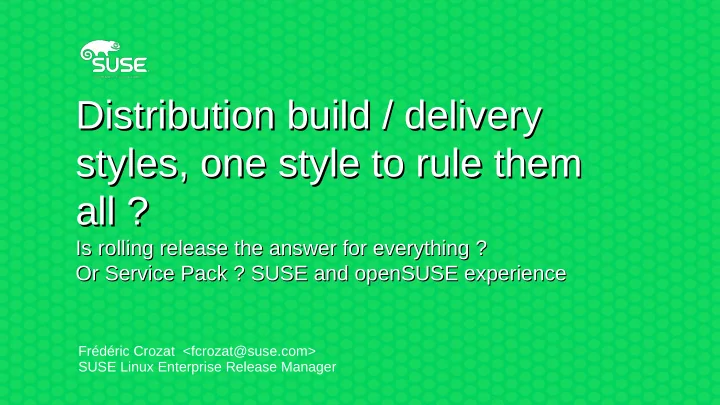

Distribution build / delivery Distribution build / delivery styles, one style to rule them styles, one style to rule them all ? all ? Is rolling release the answer for everything ? Is rolling release the answer for everything ? Or Service Pack ? SUSE and openSUSE experience Or Service Pack ? SUSE and openSUSE experience Frédéric Crozat <fcrozat@suse.com> SUSE Linux Enterprise Release Manager
What we don’t do
What we do
Distribution delivery styles Distribution delivery styles 4
Three distributions styles Rolling: ● Bleeding edge – Release as soon as possible – Example: openSUSE Tumbleweed, ArchLinux, Gentoo – Regular: ● Release one to twice a year – Update their entire stack for each release – Example: Ubuntu, Fedora, Debian – LTS / Enterprise: ● Slow cadence (yearly or even less than that) – Very few things move between sub-releases – Example: openSUSE Leap, Ubuntu LTS, SLES/SLED, RHEL – 5
Can a geeko adapt to everything ?
openSUSE/SUSE terminology SLE = SUSE Linux Enterprise (Server / Desktop) ● Enterprise distribution, developed by SUSE – openSUSE Factory: ● Development repository – openSUSE Tumbleweed: ● openSUSE Rolling release, by openSUSE, using only Factory – packages, tested by openQA openSUSE Leap: ● openSUSE Stable release, based on SLE common code + – Packages from Factory (or specific repository) 7
Integration process Integration process 8
Submitting to SLE or Factory SR is moved to a specific staging for testing Submit Target: Distro:Staging:Foobar Request Distro Developer creates a Mini-ISO is generated Submit Request Check-in team and various openQA runs a bot small testsuite review SR Everything is fine OpenQA runs ISO are SR committed to (openQA is green and full testsuite generated for all arch Distro review was ok)
Factory first policy (for SLE) New guidelines in effect for development since SLE12 SP3 ● Whenever possible, development should be done on OBS ● (openSUSE:Factory) and pushed back to SLE15-SP1 When submission is reviewed and accepted on Factory, it is automatically ● submitted to SLE15 (unless packages was branched in SLE15). This was in place for most of the development period. When a submission is sent to SLE15, a automated check will ensure ● similar submission was done to openSUSE:Factory Based on this knowledge, SLE Release Managers decide what to do with ● those submit requests You can see SLE15(SP1) development “live” since we are in Beta phase ● 10
Factory first policy enforcement / bot reviews Legal bot (license OK) ● Maintenance bot (does the package build in the developer project) ● Changelog checker bot (each SLE submission must have a bug or feature ● number in its changelog, ensure patch are mentioned in changelog) Leaper bot (check if the package is supposed to be following Factory or is ● allowed to fork): If the package is inherited from Factory, ensure the same changes are – already in Factory or waiting to be approved by Factory maintainer. If it is not the case, submission is automatically REJECTED If package is allowed to branch, still check if identical changes have been – pushed to Factory and give the results as a comment to the submission (will not auto-reject) 11
Lessons learned Using automation as much as possible: People are less emotional if they get an rejection by a – automated tool which is enforcing a policy than a human If the rejection can be informative, it is better – Have a way to override the tool, if needed – Empower your contributors, ensure they don’t have to do – work several times 12
Right tooling allows everything Right tooling allows everything 13
openSUSE Tumbleweed Everything is rolling all the time ● Many stagings in parallel (14 for core packages + up to 150 for leaf ● packages) For instance, new gcc / python / perl will take some time before being ● accepted, but won’t slow other changes Average “quiet” (busy) week: ● ● 3 (5) distribution releases ● 150 (300) packages updated ● 20 (50) packages added / 20 (50) removed to DVD ● 1 (2) kernels updates 14
SUSE Linux Enterprise 15 (currently SP1) Initially a subset of Tumbleweed packages ● Service Pack 1 is being developed (visible on OBS) ● About 3300 source packages are inherited from SLE15 (SP0) ● Corresponding binaries RPMs are re-used (or their maintenance ● updates) Only 900 sources packages branched in SP1 (30%) and rebuilt ● SP1 = SP0 RPM + SP1 branches RPM ● Yearly cadence ● 15
openSUSE & SUSE Linux Enterprise Developed together - Reminder openSUSE Tumbleweed Leap Leap 15.0 15.1 Shared Core Shared Core 15.0 151 SLE SLE 15 15 SP1 Packages list with their origin: https://build.opensuse.org/package/view_file/openSUSE:Leap:15.0/00Meta/lookup.yml
openSUSE Leap 15.x Use SLE 15 packages as a base ● Leap 15.0 <=> SLE15 SP0 – Leap 15.1 <=> SLE15 SP1 – Add Tumbleweed packages when not available on SLE15 ● Unlike SLE15 SP1, openSUSE Leap 15.1 is fully rebuild for ● each release 17
openSUSE Leap 15.x packages origin 14000 12000 10000 Devel 8000 SLE 15 SP1 SLE 15 SP0 6000 Leap 15.0 Tumbleweed 4000 2000 0 Leap 15.0 Leap 15.1 18
openSUSE Leap 15.x packages origin Leap 15.0 ● 12000 “source” packages – 2940 inherit from SLE15 (~30%) – 8600 from Tumbleweed – A few from Devel projects (KDE 5 LTS) – Leap 15.1 ● 12700 “source” packages – 8142 from Leap 15.0 – 600 from SLE15 SP1 – 2400 from SLE15 SP0 – 1200 from Tumbleweed – 19
Summary Thanks to OpenBuildService, openQA and our processes, we can deliver any distributions style we want Questions ? 20
Recommend
More recommend